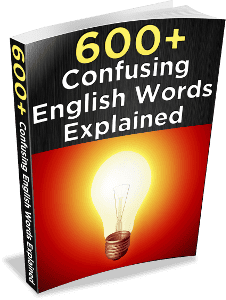
 Students often say, “I have a doubt” and then ask me something about the English language.
Students often say, “I have a doubt” and then ask me something about the English language.
However, native English speakers don’t usually say it this way. If you want to know the answer about something, you should say “I have a question.”
The word doubt in English is more often used as a verb. It means to be uncertain with somewhat of a negative connotation – you are expressing that you do NOT have confidence about something, or you believe something probably WON’T happen or is NOT true:
- I doubt that my team will win the championship.
= I think my team is unlikely to win - After reading that book, I started to doubt some of my beliefs.
= I began to feel uncertain that my beliefs were true/reliable - My kids have always doubted the existence of Santa Claus.
= my kids always suspected that Santa Claus did NOT actually exist
When used with “have,” we typically use “doubts” in the plural, usually followed by “about“:
- I have my doubts about his ability to do the job.
= I am not 100% certain that he can do the job - The senator has some doubts about whether the new law will be effective.
= The senator is not confident about the new law
We can also say a situation is in doubt if it is uncertain; it is not yet decided/resolved:
- They haven’t yet finished the scientific study, so the outcome is still in doubt.
= not yet finalized - The company has been having financial problems and its future is in doubt.
= uncertain; the company may succeed or it may fail
Let’s look at more expressions with the word doubt:
room for doubt
If there’s room for doubt, it means that there is a chance that a situation may not be exactly as it seems.
- Don’t believe everything you read on the internet. There’s always room for doubt.
plant/sow a seed of doubt
This expression means to do or say something that makes another person begin to feel doubt, begin to feel uncertain or suspicious:
- She claimed she wasn’t cheating on her husband, but her frequent phone calls to another man planted a seed of doubt in his mind.
give someone the benefit of the doubt
This phrase means to decide to believe/trust someone, in a situation where you could choose either to believe or not to believe him/her.
- The boss doesn’t track our time; she gives us the benefit of the doubt.
= She trusts the employees to work appropriate hours - My brother broke my computer and said it was an accident. I gave him the benefit of the doubt.
= I believe his claim that it was accidental and he didn’t do it on purpose
no doubt / without a doubt
These expressions are used when you are very certain or very confident about something. You can also use “without a shadow of a doubt” for even more emphasis on the fact that you are 100% certain:
- She’s so smart. She’ll do well in college, no doubt.
- There’s no doubt that this medication works; it has been tested extensively and proven to have great results.
- This is, without a doubt, the best chocolate cake I’ve ever had!
- I’ve known him for ten years and I can say without a shadow of a doubt that he’s an honest man.

